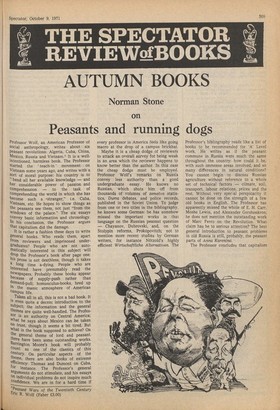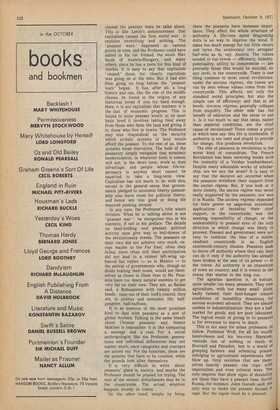THE SPECTATOR REVIEWABOOKS
AUTUMN BOOKS
Norman Stone on
Peasants and running dogs
Professor Wolf, an American Professor of social anthropology, writes about six Peasant revolutions: Algeria, Cuba, China, Mexico, Russia and Vietnam.'' It is a wellintentioned, harmless book. The Professor started the ' teach-in' movement on Vietnam some years ago, and writes with a sort of moral purpose: his country is to " bend all her available knowledge — and her considerable power of passion and comprehension — to the task of comprehending the world in which she has become such a •stranger," i.e. Cuba, Vietnam, etc. He hopes to show things as the peasants see them, not just "from the Windows of the palace." The six essays convey basic information and chronology. In his conclusion, the Professor argues that capitalism did the damage.
It is rather a fashion these days to write general books. Who reads them, apart from reviewers and imprisoned undergraduates? People who are not automatically interested in this subject will drop the Professor's book after page one: his prose is not deathless, though it takes a. long time a-dying. People who are interested have presumably read the ,hewspapers. Probably these books appear oecause of supply-push rather than demand-pull; homunculus-books, bred up in the manic atmosphere of American Campus life.
Taken all in all, this is not a bad book. It IS even quite a decent introduction to the subject; the information and the general themes are quite well-handled. The Professor is an authority on Central America; What he says about Mexico can be taken on trust, though it seems a bit tired. But What is the book supposed to achieve? On the general theme of lord and peasant. there have been some outstanding works. Barrington Moore's book will probably count as one of the classics of this century, On particular aspects of the theme, there are also books of extreme efficiency: Thomas and Dumont on Cuba, for instance. The Professor's general arguments do not stimulate, and his essays on individual problems do not inspire much confidence. We are in for a hard time if
every professor in America feels like going macro at the drop of a campus brickbat.
Maybe it is a cheap dodge of reviewers to attack an overall survey for being weak in an area which the reviewer happens to know better than the author. In this case the cheap dodge must be employed. Professor Wolf's remarks on Russia convey less authority than a good undergraduate essay. He knows no Russian, which shuts him off from thousands of volumes of zemstvo statistics, Duma debates, and police records, published in the Soviet Union. To judge from one or two titles in the bibliography, he knows some German: he has somehow missed the important works in that language on the Russian peasant question — Chayanov, Dubrovski, and, on the Stolypin reforms, Prokopovitch; not to mention more recent studies by German writers, for instance Notzold's highly efficient Wirtschaftliche Alternativen. The
Professor's bibliography reads like a list of books to be recommended for 'A' Level work. He writes as if the peasant commune in Russia were much the same throughout the country: how could it be, with such immense areas involved, and so many differences in natural conditions? You cannot begin to discuss Russian agriculture without reference to a whole set of technical factors — climate, soil, transport, labour relations, prices and the rest. Without very spec;a1 perspicacity it cannot be done on the strength of a few old books in English. The Professor has apparently missed the whole of E. H. Carr, Moshe Lewin, and Alexander Gershenkron: he does not mention the outstanding work of Marc Ferro on the Revolution. What claim has he to serious attention? The best general introduction to peasant problems in old Russia is still, probably, the peasant parts of Anna Karenina.
The Professor concludes that capitalism caused the peasant wars he talks about. This is like Lenin's announcement that capitalism caused the first world war : it explains everything and nothing. The 'peasant wars' happened at various points in time; and the Professor could have added to his list Ireland, the south Slav lands of Austria-Hungary, and many others, since he has a taste for this kind of ramble. It is easy to say that capitalism ' caused ' these, for, clearly, capitalism was going on at the time. But it had also been going on long before the 'peasant wars ' began. It has, after all, a long history and can, like the rise of the middle classes, be found in the origins of any historical event if you try hard enough. Here, it is not capitalism that matters: it is the fact of economic progress. This is bound to incur peasant wrath: at its most basic level it involves taking food away from those who farm the land and giving it to those who live in towns. The Professor may wax rhapsodical on the security which archaic systems of land tenure afford the peasant. To the rest of us, these systems mean starvation. The bulk of the peasantry simply recognize that economic modernization, in whatever form it comes, will not, in the short term, work to their advantage; and people whose life-expectancy is anyway short cannot be expected to take a long-term view. Capitalism has not much to do with this, except in the general sense that governments pledged to economic liberty presumably also leave room for political liberty, and hence are less good at doing the required pushing around.
In any case, the Professor's title wants revision. What he is talking about is not 'peasant war ' : he recognizes this in his contents, if not in his preface. The details on land-holding and peasant political activity soon give way to boil-downs of the revolutionary events. The peasants on their own did not achieve very much, except maybe in the Far East; often they failed; more often still their participation did not lead to a violent left-wing upheaval but rather — as in Mexico — to the arrival of governments who, though no doubt holding their noses, would see themselves as closer to Diem than to Ho. Peasants have too many natural enemies to get very far on their own. They are, as Balzac said, a Robespierre with twenty million heads : once out of their lord's control, they are, in politics and economic life, halfgangster, half-buffoon.
It is an exercise of the most pointless kind to deal with peasants as a sort of global Archers. Talking in the same breath about Chinese peasants and Nestor Makhno is impossible: it is like comparing a sausage and a rose. For a social anthropologist like the Professor, generations and individual differences may not matter much, once categories and concepts are sorted out. For the historian, these are the pennies that have to be counted, while the pounds look after themselves.
It is very difficult to write about peasants' place in society, and maybe the
Professor should be praised for trying. The root of the seismic disturbances may be in the countryside. The actual eruption happens mostly in towns.
On the other hand, simply by being
there the peasants have immense importance. They affect the whole structure of authority. A life-time spent dragooning dolts is no way to improve the mind. It takes too much energy for too little return and turns the aristocracy into arrogant half-wits as in, say, Austria. The values needed to run towns — efficiency, honesty, punctuality, ability to compromise — are precisely those that would be suicidal, on any level, in the countryside. There is one thing common to most social revolutions: under the anciens regimes, the towns are run by men whose values come from the countryside. This affects, not only the standard moral principles, but also the simple one of efficiency; and that at all levels. Anciens regimes generally collapse from stupidity. The other side has the benefit of education and the sense to use it. Is it too much to say that ideas, rather than material conditions, are the chief cause of revolutions? There comes a point at which men say: this life is intolerable. If authority is too inert and stupid to provide for change, this produces revolution.
The rOle of peasants in revolutions is the worst kind of conundrum. The French Revolution has been receiving books with the intensity of a Verdun bombardment. Despite many admirable works of scholarship, are we any the wiser? It is easy to say that the decisive act occurred when the peasants withdrew their support from the ancien regime. But, if you look at it more closely, the ancien regime was never really supported by the peasants; nor was it in Russia. The anciens regimes depended for their power on sagacious occasional applications of brutality; their chief support, in the countryside, was the seeming impossibility of change, or the undesirability in peasant eyes of the only direction in which change was likely to proceed. Peasant and government were not easy to combine: the idea of a stable, obedient countryside is an English nineteenth-century illusion. Peasants seek to throw off authority where they can; they can do it only if the authority has already been broken at the seat of its power — in the towns. All authority is an imposition of town on country; and it is events in the towns that matter in the long run.
The agrarian question is, at bottom, quite simple: too many peasants. They ruin agriculture, with too many small plots, badly farmed; their land-hunger creates conditions of instability disastrous for serious economic advance. They are almost useless in industrialization: they are a bad, market for goods, and are poor labourers. The logical result of giving in to peasants is for everyone to starve to death.
This is not easy for urban professors to follow. Professor Wolf, for all his woollY
benevolence and his tea-cosy Marxism,
reminds one of nothing so much as Bouvard and Pecuchet, lost in a world of grasping farmers and scheming priests,
indulging in agricultural experiments that blow up. Only societies that are theiw
selves heavily peasant can cope with
imperialism and even colonial wars. The only empires that show signs of durabilitY are those that have a peasant base: Soviet Russia, for instance. Jules Guesde said: the only way to make the peasant fecund is rape. But the rapist must be a peasant.











































 Previous page
Previous page